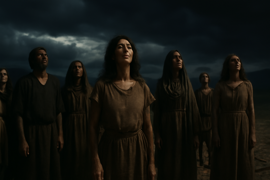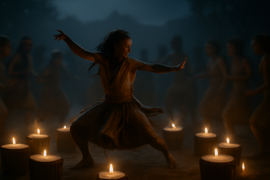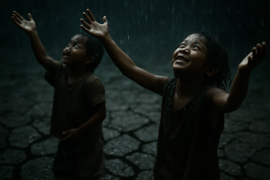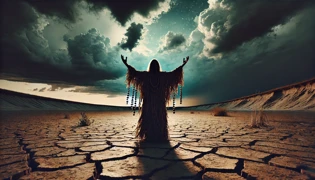Introduction
Under a sky so clear it felt invisible, the red dust of Benguela clung to every leaf and grain of soil. For months the sun had ruled without mercy, drawing life from the land until the rivers were mere ribbons of cracked clay and the wells stood echoing hollow below the earth. In that silence between earth and sky lived the people of a small village, their hearts as parched as the fields they tended. They whispered legends of a man called Kalova, a rainmaker whose lineage stretched back to the ancestors who once coaxed monsoon clouds across the high plateaus. No one beyond the dim outline of the hills had seen him dance, yet every whispered prayer and shaken rattle called for his return.
The elders spoke of Kalova with reverence: his feet drummed rhythms older than language, his voice rose in chords that shook the heavens, and his arms drew signs in the air as if weaving a net to catch the clouds. They said he wore a robe of woven grasses and beads, each bead a drop of hope, each strand a promise that water would return. When the drums began, the ground itself would hum, and the wind would answer in low moans as if stirred from a dream. Children would cling to their mothers, eyes wide with wonder, while the livestock would follow him in a trance, knowing deep inside that his dance was the only path to survival.
Yet certainty turned to doubt when the drought stretched on. Some argued that old ways had lost their power, that the world was changing beyond the reach of chants. Others held to faith, lighting fires of incense at dawn and dusk, leaving offerings of millet and honey by the streambeds that no longer ran. One night, beneath the velvet hush of stars, those hopeful voices rose together in a great lament, a single plea to the unseen forces that governed rain. In the hush that followed, a distant sound teased their ears—a drum’s faint heartbeat, calling them out into the night. It was Kalova’s call. And as fear and hope collided in their chests, they stepped into the darkness, ready to follow the Rainmaker once more.
The Land Parched: A Plea to the Skies
When dawn first broke over Benguela’s rolling plains, it offered no comfort—only a harsh light that glared down on cracked earth and drooping vegetation. Villagers gathered at the edge of the dry riverbed, their feet stirring dust that danced in the air like ghosts of water. Mothers held infants wrapped in cloth, their eyes darting to the horizon where no raincloud stirred. Farmers knelt with hands pressed against the ground, feeling its heat and hunger. They sang a lament to the ancestors, their voices trembling in the still air: ‘Grandmothers and fathers, hear our call, send the rain, send the rain.’ But the sky remained empty.

Into that silence came a single drumbeat, hushed at first but growing with each breath. Hearts raced with both hope and fear. The elders exchanged glances that mirrored the crowd’s longing. Could it be true? Had Kalova heard their cry? They watched as a figure emerged from a distant copse of mopane trees—a tall man wrapped in grasses and shells, his bare chest painted with ochre and white stripes. He carried a small drum cradled under one arm and a carved wooden staff tipped with feathers. With each step, the dust settled behind him like a fading memory.
Kalova paused at the center of the gathering. He placed the drum on an upturned calabash and struck it with soft palms. The sound rippled through the crowd, and even the birds in nearby thorn trees held their breath. In a voice that was deep and clear, he chanted words that none but the oldest knew, invoking forces beyond mortal sight. ‘Open your gates, O sky,’ he intoned. ‘Pour down your waters upon Benguela’s barren land.’ As he chanted, his feet began to move in patterns like the flow of a river, stomping, sliding, rising—each motion recalling the murmur of water across stone.
Between the first and second verse of his chant, the heavens responded. A faint rumble rolled across the distant hills. Villagers tightened their circle, watching the sky darken in slices. When Kalova reached the second stanza, he struck the drum harder, faster, sending vibrations into the earth. Dust rose in spirals, drawn upwards by an unseen hand. The drumbeat became a heartbeat, and the heartbeat became thunder. A single bolt flickered above the horizon, branching like a silver tree. Fear mingled with hope as rain began to fall—first in hesitant drops, then in a roaring deluge that drove them to their knees, faces turned skyward. Each drop was a blessing, each burst of thunder a word of promise fulfilled.
The Rainmaker’s Sacred Chants and Dances
As the sky opened over Benguela, Kalova moved among his people, offering words of guidance and comfort. His dance had stilled the drought, but the work was not yet done. He called them to the old baobab grove at twilight, where the roots of ancient trees drank deep of the night’s bounty. Beneath the glowing embers of torches, he taught them the rhythms that bound rain to earth. ‘Every drop you welcome,’ he said, ‘carries the memory of our ancestors. Honor it with your steps.’

That night, villagers formed a circle around a central fire. Men beat drums fashioned from hollow logs, women shook rattles braced with seeds and shells. Children clapped their hands, their laughter mingling with the crackle of flames. At the heart of the circle, Kalova strode with solemn grace. His robe rustled like awakened grasses as he traced sacred symbols in the firelight: arcs for rivers, spirals for wind, zigzags for lightning. He raised his voice in a hymn that rose and fell like a living thing, calling for unity between sky and earth. ‘Let water renew the face of Benguela,’ he sang. ‘Let the land drink deeply, let life awaken in every furrow.’
With each chorus, the grove beneath the baobabs thickened with mist. The air grew cool, carrying the fresh scent of rain on distant winds. Kalova’s eyes glowed with quiet intensity as he moved more swiftly, faster, until his feet seemed to float above the ground. Sweat and rain intermingled on his brow, his breath steady in the melody. Then, as he leapt skyward, the heavens responded: a heartbeat of thunder, a downpour that soaked them to the skin. Torrents raced down the baobab roots, carving new streams that fed parched gullies.
In the days that followed, the people of Benguela learned to celebrate the rain as a gift to be shared. They danced at every sunrise and sunset, offering gratitude in quiet songs and humble ceremonies. Kalova taught them how to channel the waters into fields of sorghum and millet, how to store excess in clay cisterns for seasons yet to come. The children watched wide-eyed as the land transformed: buds unfurled, grasses shivered with dew, and birds returned to fill the canopy with song. Under the careful guidance of their rainmaker, the villagers realized that nature’s balance depended on respect and reciprocity. Their dances no longer were pleas but hymns of thanksgiving, woven into the very fabric of their lives.
Storm’s Embrace and the Gift of Water
Weeks turned into months, and the rains established a rhythm all their own. Mornings greeted the people of Benguela with soft mists that lifted to reveal green fields heavy with promise. The river ran clear, reflecting the sky like polished glass. Under this renewed prosperity, Kalova withdrew to his hut on the edge of the forest, content that his magic and the villagers’ devotion had restored the land’s harmony.

But tranquility carried its own challenge. Some whispered that Kalova’s power was too great, that he alone bore the right to touch the sky. Doubts and envy flickered like embers in the corners of conversations. A young herdsman named Tando questioned the rituals: ‘Why must we follow one man’s songs?’ he asked. ‘Is rain not a gift to all?’ His words spread through the village like threads of discord. The elders, cautious and wise, reminded the people that gratitude must never turn to presumption. ‘Respect the balance,’ they warned. ‘Honor both giver and gift.’
One night, when a storm rolled in with unusual ferocity, a crack of lightning struck the baobab grove, splitting a great trunk in two. Panicked cries echoed through the village as wind uprooted small trees and rains pelted the thatched roofs. Kalova emerged from his hut, chanting urgently. With arms outstretched he faced the tempest, weaving his staff through the air to contain the lightning’s fury. Behind him, villagers joined in a low hum, adding their will to his own. Inch by inch the wind abated, thunder softened to a distant rumble, and the rain subsided into a gentle shower that nourished without harm.
At dawn, the village awoke to a scene of quiet marvel. The shattered baobab lay across the grove like a fallen giant, but all living things remained unharmed. Tando, humbled by the storm’s intensity, approached Kalova beneath the misted canopy. ‘I questioned your gift,’ he said, voice trembling. ‘I forgot that power demands responsibility and unity.’ Kalova placed a hand on the young man’s shoulder and smiled, the promise of gentle rain resting in his eyes. ‘Balance requires trust,’ he replied. ‘Use water with wisdom, and the sky will answer your call.’ Together they worked to clear the grove, knowing that storms, like blessings, are most cherished when met with reverence.
Conclusion
In the years that followed, the story of Kalova, the Rainmaker of Benguela, became more than a legend—it was a living tradition passed from parent to child, woven into every celebration. Each planting season began with a dance for the clouds, each harvest closed with a hymn of gratitude. The people learned that water was more than a resource: it was a bond between earth, sky, and those who walked in between. Through the ages, they remembered Kalova not just as a man who swayed drums and spoke to storms, but as a guardian of balance whose legacy endured in every drop that fell. And so, whenever dark clouds darken the horizon, the drums still beat in Benguela, calling forth rain and reminding all who listen that reverence and unity can shape even the wildest tempests into blessings of life and renewal. This is the gift of the Rainmaker—a reminder that harmony with nature begins when we open our hearts to the rhythm of the earth and the whispers of the sky.
_Let this tale of Benguela encourage you to find your own rhythm with the world around you, to honor the gifts that sustain us, and to remember that every storm carries water—and every heart carries hope._


















